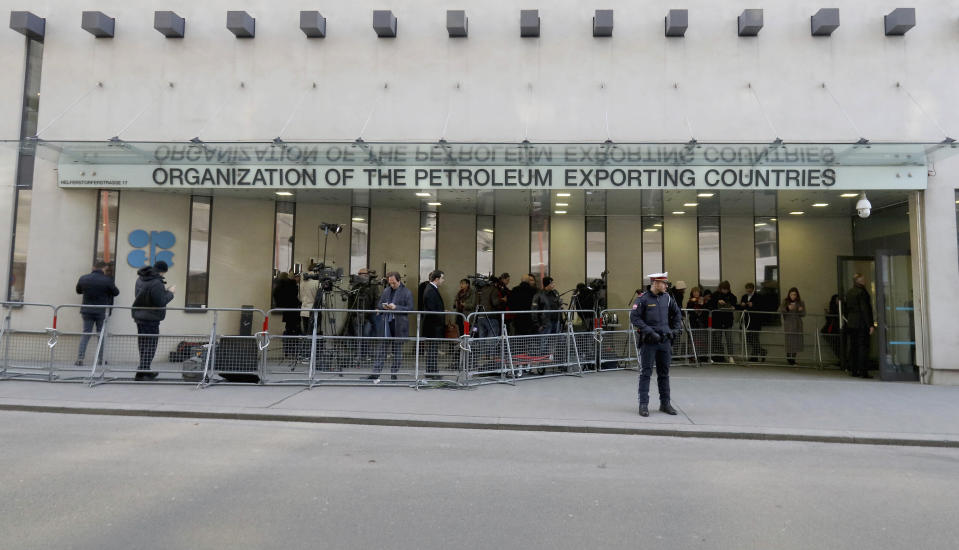Explainer: Why oil prices are crashing
Gas prices could soon get very cheap for Americans, but that is bad news for the global economy.
Crude oil prices crashed on Sunday night by more than 30%, the biggest single-day drop since 1991. Yes, it has to do with coronavirus, but not just coronavirus—it’s the convergence of coronavirus concerns with preexisting oil market tensions between Russia and Saudi Arabia.
Saudi Arabia vs Russia
Here’s what triggered the drop: Saudi Arabia dramatically slashed its prices by as much as $8 per barrel in a play for market share that is also a shot at Russia.
Here’s the context: On Friday, OPEC (the Organization of Petroleum Exporting Countries) met in Austria for its 178th conference meeting, where the most notable outcome was the collapse of an OPEC proposal for all member nations to cut oil output (by 1.5 million barrels per day) amid waning demand.
Cutting output would in theory keep prices stable—the idea is to produce less crude so that there’s not a glut of supply amid waning demand.
But Russia, which is not an OPEC member (but is part of the newly named OPEC+), would not agree to cut its output.
The reason for that is actually a shot at American oil: Russia and its president Vladimir Putin feel that cutting output further as an effort to keep prices high would benefit the U.S. shale industry (frackers), which has thrived under the existing OPEC+ agreement. (David Nelson, chief strategist at Belpointe, calls this oil price war a dreaded “Black Swan event for U.S. shale.”)

Bloomberg News reports that after the talks stalled on Friday, the OPEC gathering “had the atmosphere of a wake.”
Saudia Arabia responded to Russia’s refusal to cut output by slashing its prices.
Shrinking demand for oil amid coronavirus
Oil markets were already feeling the hit from coronavirus concerns. West Texas Intermediate crude (CL=F) is down nearly 50% in 2020 so far. Both OPEC and the International Energy Agency (IEA) are warning that global oil demand will shrink in 2020, not grow, for the first year in more than a decade, due to coronavirus stalling areas of the economy like air travel.
Goldman Sachs, in a new note, is now predicting oil at $20 a barrel. (For reference, it was at $60 in early January.) “The prognosis for the oil market is even more dire than in November 2014, when such a price war last started, as it comes to a head with the significant collapse in oil demand due to the coronavirus,” Goldman oil analyst Damien Courvalin wrote.
So, what does this mean for the average U.S. consumer? In the short-term, cheaper prices at the pump, though that typically takes a few weeks to kick in.
But the oil price war is on balance extremely negative for the economy. It already tanked markets on Monday morning, particularly shares of names like Exxon and Chevron.

Oil crashes typically prompt uncertainty and geopolitical tensions. As Jefferies explains in a note on Monday, “Moves in energy prices are a zero-sum game. On the surface, sovereign credit and currencies will be impacted the most as inflation, fiscal and current accounts are altered. The second-round effects are the solvency of energy companies alongside any deterioration in local credit conditions & bank lending set against improving real incomes for the consumer... Ultimately, the downdraft in energy prices will produce a deflationary bias to economic data, forcing policymakers to keep monetary policy much looser than originally thought.”
For those who think cheaper gas could be a boon to the U.S. consumer, MUFG chief economist Chris Rupkey dispelled that in a note on Sunday night: “Right now the idea that lower gasoline prices is going to put more cash in workers' pockets and give consumer spending and the economy a boost doesn't seem to cushion the blow for stock market investors. They want out. Big time. The sky is falling. Get out, get out while you can. Wall Street's woes have to eventually hit Main Street's economy hard.”
And Morgan Stanley analysts, in a note on Monday, declare that lower oil prices are a “net negative for the US economy today.”
—
Daniel Roberts is an editor-at-large at Yahoo Finance and closely covers sports business. Follow him on Twitter at @readDanwrite.
Read more from Yahoo Finance about coronavirus and the economy:
Amazon running remote-work stress test for employees amid coronavirus concerns
Twitter, Amazon, Nike and more take emergency coronavirus precautions
All the ways coronavirus is hitting the sports world
Nike warns coronavirus will have ‘material impact’ on its China business
HSBC downgrades Nike on coronavirus fears
Coronavirus is stoking fears of Tokyo Olympics customer cancellations
Under Armour warns of coronavirus impact in China, analyst says it has ‘peaked’ in America
